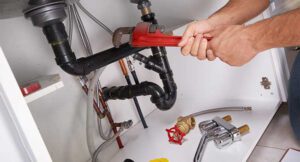Plumbers specialize in installing drainage systems, potable water systems, and sewage systems. They must be licensed to work in certain areas of the country. They can also be hired to repair and install water heaters, faucets, and toilets. A plumber can also help people find ways to save money on their water bills by installing energy-efficient appliances, such as solar water heaters.

The job description of a master plumber includes a variety of responsibilities and requires excellent attention to detail. The master plumber must make sure that all work is completed to the highest quality and that all tools and equipment are properly stored and discarded when the job is finished. They must also have an eye for potential problems and must be able to anticipate them before they occur. In addition, master plumbers typically work long hours and may be required to maneuver in cramped spaces.
A master plumber typically works in the construction industry and performs plumbing work on buildings. They usually work full-time, although their schedules may vary. Many are self-employed, and some may be on call 24 hours a day. The work of a master plumber can be physically demanding, as they must work in tight spaces and carry heavy tools.
To become a master plumber, you must complete an apprenticeship program or a plumbing program at a technical college. These programs combine classroom training with on-the-job training. The program usually lasts two years and covers plumbing codes, blueprint reading, and plumbing techniques. The job description for a master plumber should be detailed enough to show the specific tasks that a master plumber is responsible for.
In addition to working with local contractors, master plumbers may be responsible for preparing bids and material take-offs for new construction projects. Opportunities for master plumbers are expected to grow faster than average, with a predicted 68,200 job openings by 2028. In addition, a master plumber can become an instructor at vocational schools.
A master plumber’s duties include installation and repair of plumbing systems in homes and commercial structures. They also work with other trades to make sure that the construction process goes smoothly. They can install plumbing fixtures and sanitary appliances and can perform complex diagnostics on water and gas piping systems. A master plumber must also be patient, have great manual dexterity, and pay attention to detail.
A master plumber’s salary varies widely. The highest-paid master plumbers are employed by plumbing companies. They typically earn around $68,611 a year.
In most states, there are certain requirements that must be fulfilled before a plumber can be licensed. This may include having at least 500 hours of plumbing training or having worked for two and a half years as an apprentice. However, if you have been in the field for more than eight years and have experience in residential or commercial settings, you can also use your past training as credit for your licensing process.
The state regulates the plumbing trades, and applicants must meet specific requirements to become licensed plumbers. Plumbers must meet regulations and pass exams that are specific to the city. In addition to these requirements, plumbers must comply with local zoning codes and have at least seven years of work experience.
In some states, plumbers must have at least four years of experience to be licensed. In addition to this, plumbers must pass an exam that tests their knowledge of plumbing. If they don’t have enough experience to obtain a license, they must take an apprenticeship in a licensed plumbing company. In addition to this, plumbers must pay a small fee, usually $25. And, of course, plumbers must be insured.
After you have completed the plumbing apprenticeship, you must complete a trade exam. Depending on your state, you might also need to attend a plumbing trade school that offers exam preparation courses. However, you must remember that each state has different exam dates and schedules. In general, you can expect to take your licensing exam once or twice a month.
The requirements for becoming a plumber are quite different from other states. In Alabama, the plumber must have at least two years of experience and pass a plumbing apprentice training program. This training consists of classroom and on-the-job training. This is the first step toward becoming a licensed plumber.
